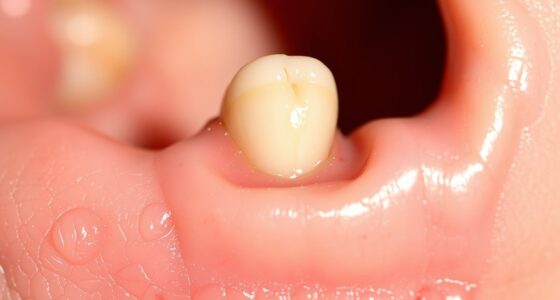Yes, you can reverse early-stage cavities in kids naturally through a combination of good oral hygiene and a nutrient-rich diet. Make sure your child brushes with fluoride toothpaste twice daily and flosses regularly. Encourage them to eat calcium-rich foods like dairy, along with fruits and vegetables that stimulate saliva production. Limit sugary snacks and introduce probiotics from yogurt to support oral health. Chewing sugar-free gum can also help. While these methods can be effective, understanding more about proper oral care will equip you better to manage your child's dental health.
Key Takeaways
- Establish good oral hygiene habits early by brushing with fluoride toothpaste and daily flossing to reduce cavity risk.
- Incorporate nutrient-rich foods like dairy, fruits, and vegetables to support enamel strength and stimulate saliva production.
- Chew sugar-free gum after meals to promote saliva flow, which helps wash away harmful bacteria and sugars.
- Regular dental check-ups ensure early detection of cavities and allow for preventive measures like fluoride treatments.
Understanding Cavities in Children

Cavities are a common issue in kids because their enamel is thinner and softer, making their teeth more prone to decay. This susceptibility means you need to be especially vigilant about your child's oral health.
Frequent snacking, especially on sugary treats, greatly increases the risk of tooth decay in children's teeth. If left untreated, cavities can lead to pain, infection, and even affect the development of their permanent teeth.
To help prevent tooth decay, establishing good oral hygiene habits early on is essential. Supervise your child's brushing and flossing to guarantee they're using the correct techniques and not missing any spots. Make brushing fun and engaging so they look forward to it, turning it into a positive routine.
In addition to good oral hygiene, encourage healthier snack options. Fresh fruits, vegetables, and whole grains can be great alternatives to sugary snacks.
Educating your child about the importance of taking care of their teeth will empower them to make better choices as they grow. By understanding the unique characteristics of children's teeth, you can implement effective measures to promote their long-term oral health.
Effective Home Remedies

When it comes to reversing cavities naturally in kids, focusing on nutrient-rich foods, good oral hygiene practices, and the importance of fluoride treatments can make a big difference.
You'll find that these strategies not only strengthen teeth but also help prevent further decay.
Let's explore some effective home remedies that can support your child's dental health.
Nutrient-Rich Foods
Incorporating nutrient-rich foods into your child's diet can greatly boost their oral health and help reverse early signs of cavities. Focus on providing a balanced diet that includes foods rich in calcium, Vitamin D, and fluoride. These nutrients work together to strengthen tooth enamel and promote overall dental health.
Here's a quick reference table for you:
| Food Category | Nutrient | Benefits |
|---|---|---|
| Dairy Products | Calcium, Vitamin D | Strengthens enamel and aids remineralization |
| Fruits & Vegetables | Vitamin C | Stimulates saliva, cleans teeth, and supports gums |
| Whole Grains | B Vitamins, Iron | Maintains gum health and overall hygiene |
Encourage your child to drink plenty of water, which helps wash away harmful bacteria and food particles. Adding healthy fats, like those found in fish and avocados, can also support remineralization. By focusing on these nutrient-rich foods, you're setting your child up for better oral health and reducing the risk of cavities.
Oral Hygiene Practices
Establishing effective oral hygiene practices at home is essential for your child's dental health and can greatly help in reversing early signs of cavities. Start by ensuring your child brushes their teeth with fluoride toothpaste at least twice a day. Fluoride plays a vital role in remineralizing enamel and preventing tooth decay.
In addition to brushing, make daily flossing a habit. This helps remove food particles and plaque from between teeth, where toothbrushes often can't reach, considerably reducing the risk of cavities.
Encourage your child to chew sugar-free gum after meals. This simple practice can stimulate saliva production, which washes away food particles and neutralizes harmful acids that threaten oral health.
Make sure your child stays hydrated by drinking plenty of water throughout the day. This helps rinse away sugars and bacteria, promoting a healthier mouth.
Lastly, consider incorporating nutrient-rich foods, like dairy products high in calcium, into their diet. These foods not only strengthen teeth but also support overall oral health, making it easier to prevent cavities.
Fluoride Treatments Importance
Fluoride treatments play an essential role in reversing early-stage cavities by enhancing enamel remineralization and boosting your child's protection against tooth decay. These treatments are particularly effective because they increase the fluoride concentration on the surface of children's teeth, making them more resilient to acid attacks from harmful bacteria.
Regular fluoride applications can reduce the incidence of cavities by around 25%, making them an important part of your child's dental care routine. You can also consider community water fluoridation, which has greatly decreased tooth decay rates over the past 75 years.
Incorporating fluoride treatments into your child's dental visits not only helps prevent cavities but also allows for early detection of any potential issues. Regular check-ups guarantee that their oral health is monitored effectively, catching signs of decay before they escalate.
While home care is important, professional fluoride treatments provide that extra layer of protection that toothpaste alone may not achieve. Make certain to discuss the best fluoride options with your dentist to make sure your child's smile stays healthy and cavity-free!
Nutritional Strategies for Prevention

A well-rounded diet packed with calcium, phosphorus, magnesium, and vitamin D can greatly strengthen your child's tooth enamel and enhance their overall dental health. To help prevent cavities, focus on reducing sugary foods while incorporating beneficial nutrients into their meals.
Here's a handy table to guide you:
| Nutrient | Food Sources |
|---|---|
| Calcium | Milk, cheese, leafy greens |
| Phosphorus | Fish, meat, nuts |
| Magnesium | Whole grains, legumes |
| Vitamin D | Fortified milk, fatty fish |
| Probiotics | Yogurt, kefir |
Additionally, including fiber-rich fruits and vegetables can stimulate saliva production, which helps neutralize acids and wash away food particles. Foods high in probiotics, like yogurt, support a healthy oral microbiome, reducing harmful bacteria responsible for cavities.
Lastly, be mindful of phytic acid in cereals and legumes, as it can hinder mineral absorption. By optimizing your child's diet with these strategies, you can greatly improve their dental health and decrease the likelihood of cavities.
Importance of Oral Hygiene

Maintaining good oral hygiene is just as vital as a nutritious diet in preventing cavities and ensuring your child's dental health. Regular brushing with fluoride toothpaste twice a day greatly reduces the risk of tooth decay, as fluoride strengthens enamel and helps remineralize children's teeth. It's essential to teach your kids the importance of brushing properly and making it a fun routine.
Flossing daily is another key component of oral hygiene. It removes plaque and food particles from between teeth, which toothbrushes often miss. This simple habit can play a big role in preventing cavities.
Additionally, scheduling regular dental check-ups every six months allows for early detection of any issues and professional cleanings to eliminate plaque and tartar buildup.
You might also consider dental sealants for your child's molars as soon as they emerge. These sealants act as a protective barrier against cavities by covering the pits and grooves where food particles can get trapped.
When to Seek Professional Help
If you notice your child complaining about tooth pain or sensitivity, it's essential to seek help right away, as these can be signs of serious decay.
Regular dental check-ups every six months can catch issues before they worsen, so don't skip those appointments.
Keep an eye out for any signs of advanced decay, and remember that prompt action can make a big difference in your child's oral health.
Recognizing Pain Symptoms
How can you tell when your child's dental discomfort requires a visit to the dentist?
If your child shows sensitivity to hot, cold, or sweet foods, it could indicate cavities or decay in their teeth. Pay close attention to any discomfort that lasts more than a few days, as this might signal advanced tooth decay that needs professional evaluation.
Look out for visible signs of decay, such as white spots on their teeth. These early symptoms can help you identify issues before they worsen.
Additionally, if your child suddenly becomes more irritable or has difficulty eating, it might suggest they're experiencing dental pain. Don't ignore these changes; they could warrant immediate attention from a dentist.
Frequent Dental Check-Ups
Regular dental check-ups help catch potential issues early, ensuring your child's teeth stay healthy and strong. It's recommended to schedule these visits every six months to prevent cavities and address any concerns promptly. Many cavities can develop without immediate pain, making routine check-ups essential for identifying decay before it worsens.
During these visits, dental professionals monitor tooth development and alignment, especially as your child's permanent molars emerge between ages 11-14. They can also provide tailored preventive measures like fluoride treatments and sealants to protect young teeth from cavities.
Here's a quick guide on when to seek professional help:
| Signs to Watch For | Action to Take | Frequency of Check-Ups |
|---|---|---|
| Sensitivity in teeth | Schedule an appointment immediately | Every 6 months |
| Discoloration of teeth | Consult your dentist | Every 6 months |
| Visible cavities | Seek professional help right away | Every 6 months |
Signs of Advanced Decay
Persistent toothaches, heightened sensitivity to temperature changes, and visible discoloration are key signs that your child may be experiencing advanced decay, signaling the need for immediate professional help. These symptoms often indicate damage to the tooth enamel, where cavities have progressed beyond the early stages. If you notice brown or black spots on your child's teeth, take it seriously.
Swelling or pain in the gums around the affected tooth can suggest deeper decay or a possible infection, which requires urgent dental attention. Additionally, if your child struggles to chew or you notice changes in their bite, it could mean that advanced decay is compromising the tooth structure.
Another concerning sign is the formation of an abscess, which appears as swelling and pus around the tooth root. This is a serious condition that needs immediate care from a dentist.
Holistic Approaches to Dental Care

Exploring holistic approaches to dental care can offer effective and safe options for treating and preventing cavities in kids. These methods focus on maintaining the health of your child's teeth while minimizing exposure to harmful substances.
For instance, Ozone Therapy effectively targets cavity-causing bacteria without damaging healthy tissue, making it a non-invasive treatment option.
Another holistic solution is Silver Diamine Fluoride, which provides localized treatment for early decay while preserving tooth structure and reducing fluoride exposure. You might also consider non-toxic, metal-free fillings, which align with holistic dentistry principles, emphasizing safety for your child's oral health.
Incorporating natural remedies like licorice root and aloe vera can further help prevent cavities, as they exhibit antibacterial properties against harmful oral bacteria. By prioritizing safe materials and methods, you're not just supporting dental health but also your child's overall well-being.
These holistic approaches can empower you to take charge of your child's dental care, ensuring their teeth stay healthy while reducing reliance on invasive treatments. Embracing these strategies can lead to a brighter, healthier smile for your child!
Frequently Asked Questions
Can I Reverse My Child's Cavity?
You can potentially reverse your child's cavity by improving their oral hygiene, ensuring a balanced diet, and using fluoride treatments. Regular check-ups with the dentist are essential for monitoring progress and addressing any concerns promptly.
Can You Reverse a Cavity Naturally?
Imagine your smile brightening as you wonder if you can reverse a cavity naturally. With proper care, a balanced diet, and good hygiene, you can strengthen enamel and halt decay's progression effectively.
How Do You Stop Cavities From Growing in Kids?
To stop cavities from growing in kids, supervise regular brushing with fluoride toothpaste, limit sugary snacks, encourage a balanced diet, and guarantee routine dental check-ups. Teaching proper hygiene habits is essential for maintaining healthy teeth.
Will Cavities Ever Be Reversible?
Cavities can sometimes be reversible, especially in early stages. You'll need to focus on good oral hygiene, a nutrient-rich diet, and regular dental visits to maximize your chances of stopping decay before it worsens.
Conclusion
While some might argue that cavities can't be reversed without professional treatment, it's important to remember that early-stage cavities can sometimes be managed with natural methods. Preventing cavities naturally can include practices such as regular brushing and flossing, reducing sugar intake, and using fluoride toothpaste. These habits can help to remineralize the enamel and prevent further decay. Additionally, incorporating more tooth-healthy foods like leafy greens and dairy products into the diet can also aid in naturally reversing early-stage cavities.
By incorporating effective home remedies, focusing on nutrition, and maintaining good oral hygiene, you can make a real difference in your child's dental health.
Don't forget, though, if you're ever in doubt, consulting a dentist is key.
Taking these steps now can help your little one enjoy a healthier smile for years to come.









